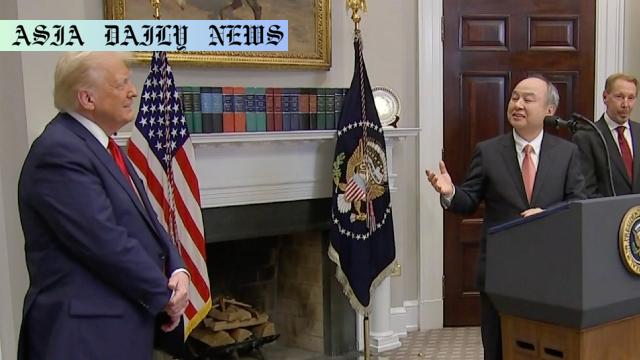SoftBank explores building a $1 trillion AI-driven tech hub in Arizona, aligned with efforts to revitalize US high-tech manufacturing.
SoftBank plans a $1 trillion high-tech hub in Arizona.
Project involves AI manufacturing and industrial robots.
Potential collaboration with TSMC and Samsung Electronics.
Discussions include US tax incentives for the venture.

SoftBank’s Vision for a $1 Trillion High-Tech Hub
SoftBank Group, under the leadership of its CEO Masayoshi Son, is eyeing a monumental investment project—an ambitious $1 trillion high-tech industrial complex in Arizona, under the codename ‘Project Crystal Land.’ This initiative envisions a transformative leap in AI-powered manufacturing processes, potentially revolutionizing the production of industrial robots and other connected devices.
According to sources familiar with Son’s strategic considerations, the project aims to catapult SoftBank into a dominating role in AI-driven product innovation, while solidifying Arizona as a hub for high-tech manufacturing. Recognized globally for its venture capital efforts and technology investments, this initiative represents SoftBank’s bold move to deepen its AI footprint and foster collaborations with industry giants, including Taiwan’s TSMC and South Korea’s Samsung Electronics.
Collaboration and Strategic Alignment with Industry Giants
SoftBank’s plan underscores a strategic shift, leveraging partnerships with key players like TSMC—the world’s largest contract chipmaker—and Samsung Electronics. Both organizations are pivotal to the global chip and electronics industries, and their collaboration could elevate the scale and impact of ‘Project Crystal Land.’ The integration of AI production and cutting-edge robotics aligns seamlessly with SoftBank’s forward-looking vision in technology.
The venture also resonates with the U.S. federal administration’s economic objectives around re-invigorating the high-tech manufacturing ecosystem. Conversations with Commerce Secretary Howard Lutnick and other dignitaries underline critical discussions regarding potential tax breaks that would support this colossal investment, lowering financial barriers and paving the way for operational feasibility.
A Synergy of Politics, Economy, and Technology
The investment’s political dimension further strengthens its strategic alignment. By choosing the U.S. as its operational base, SoftBank aligns its ambitions with America’s aspirations to reclaim dominance in cutting-edge technology manufacturing, thereby reducing reliance on overseas production.
This synergy could create thousands of jobs in the Arizona tech corridor, boost the state’s economy, and reinforce the national focus on innovation while conceiving an ecosystem where global corporates, like Samsung, collaborate with local operations to realize technological aspirations on a massive scale.
In conclusion, ‘Project Crystal Land’ promises not only economic promise for SoftBank but also a substantive contribution to the burgeoning AI ecosystem globally. If successfully executed, it could set a precedent for how corporations harmonize strategic aspirations with technological evolution and national interests.
Commentary
The Visionary Potential of SoftBank’s Industrial Venture
SoftBank’s proposed investment in Arizona highlights the growing interconnectivity between corporate ambition and national interest. CEO Masayoshi Son’s strategic foresight in pushing for an AI-based industrial hub is as audacious as it is inspiring. In many ways, it positions SoftBank not merely as a profit-oriented corporate entity but as an enabler of transitional innovation streams within the global economy.
Arizona, with its strategic location and industrial infrastructure, is an ideal choice for this ambitious endeavor. Beyond its geographical advantages, the state has established itself as a pivotal player in fostering tech-forward initiatives, making it mutually beneficial for all parties involved. Coupled with support from industry titans like TSMC and Samsung, this project has all the necessary components to become a template for future high-tech collaborations.
Economic Revival and Global Competitiveness
SoftBank’s alignment with U.S. manufacturing revitalization policies is not coincidental. The current global technological race demands economies to create self-reliant systems capable of adapting to disruptions, something ‘Project Crystal Land’ seemingly addresses by developing AI-powered solutions domestically. This synergy could help redefine Arizona’s—and potentially the U.S.’s—role in the global tech landscape.
Moreover, SoftBank’s willingness to explore tax negotiations reflects a balanced approach toward ensuring national priorities are met without compromising project sustainability. This only reinforces how corporations, governments, and global industries can collaboratively drive economic resilience.
A Precedent Set for Bold Ambitions
Should ‘Project Crystal Land’ take off, it would become a shining example of how high-stakes investments can recalibrate industrial benchmarks globally. Beyond robotics and AI, the cultural and technical precedents set would likely echo across other sectors, opening doors to equitable partnerships—a win for innovation and public good alike.


